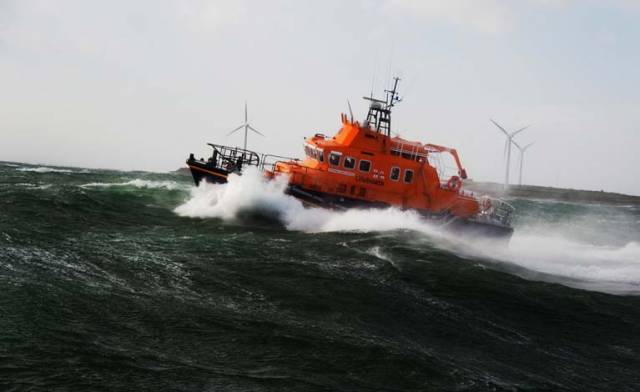Rosslare Harbour RNLI rescued a man and woman from a 12m French racing yacht which ran aground last night during the Normandy Channel Race.
The yacht which had successfully rounded the Tuskar Rock and was making its way towards the Fastnet Rock, ran aground onto rocks off Carnesore Point while also getting its propeller tangled in lobster pots.
The race, as Afloat.ie reported previously, is a French Classe 40 1,000 mile passage race to and from Caen in Britanny.
The volunteer lifeboat crew launched their all-weather lifeboat at 10.46pm last night (Wednesday 29 May) and the lifeboat under Coxswain Eamonn O’Rourke made its way to the scene some five nautical miles from the station.
Weather conditions at the time were good with no wind and a flat calm sea.
Once on scene the lifeboat crew checked that the two onboard were safe and well before attempting to tow the vessel off the rocks. However, due to a lack of wind to sail and a low tide, the attempt in the shallow rocky area had to be abandoned until the early of hours this morning. The lifeboat crew decided to take the man and woman off the yacht and bring them back to shore in Rosslare where they arrived at the lifeboat station at 3am, for a short respite.
The lifeboat launched once again at 4.50am and once on scene, the lifeboat crew was able to launch the smaller inflatable Y class boat, to access the yacht which was on the rocks. The crew then managed to cut the tangled rope from the propeller before working to free the yacht from the rocks. The vessel was then able to proceed unaided on her return passage back to France.
Speaking following the call outs, Jamie Ryan, Rosslare Harbour RNLI Volunteer Lifeboat Press Officer said: ‘Unfortunately this was the end of the race for the crew onboard the racing yacht but we would like to wish them a safe passage home.
‘While the weather was good, the shallow rocky area where the vessel got into difficulty did make this call out initially challenging along with the fact that there was a low tide and no wind. Essentially it meant our volunteers had to launch the lifeboat twice, first late last night and once again in the early hours of this morning.
‘As we approach the summer, we would remind everyone planning a trip to sea to always respect the water. Check weather and tide times in advance and do routine checks on your vessel. Always wear a lifejacket and always carry a means of communication. Should you get into difficulty, call 999 or 112 and ask for the Coast Guard.’































































